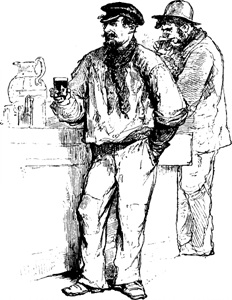 영어토론방 영어토론방 | Home>영어토론방 |
Politics The gap between the poor and the rich
페이지 정보

본문
 AMERICANS do not go in for envy.
AMERICANS do not go in for envy. The gap between rich and poor is bigger than in any other advanced country, but most people are unconcerned. Whereas Europeans fret about the way the economic pie is divided, Americans want to join the rich, not soak them. Eight out of ten, more than anywhere else, believe that though you may start poor, if you work hard, you can make pots of money. It is a central part of the American Dream.
The political consensus, therefore, has sought to pursue economic growth rather than the redistribution of income, in keeping with John Kennedy's adage that “a rising tide lifts all boats.” The tide has been rising fast recently. Thanks to a jump in productivity growth after 1995, America's economy has outpaced other rich countries' for a decade. Its workers now produce over 30% more each hour they work than ten years ago. In the late 1990s everybody shared in this boom. Though incomes were rising fastest at the top, all workers' wages far outpaced inflation.
The political consensus, therefore, has sought to pursue economic growth rather than the redistribution of income, in keeping with John Kennedy's adage that “a rising tide lifts all boats.” The tide has been rising fast recently. Thanks to a jump in productivity growth after 1995, America's economy has outpaced other rich countries' for a decade. Its workers now produce over 30% more each hour they work than ten years ago. In the late 1990s everybody shared in this boom. Though incomes were rising fastest at the top, all workers' wages far outpaced inflation.
But after 2000 something changed. The pace of productivity growth has been rising again, but now it seems to be lifting fewer boats. After you adjust for inflation, the wages of the typical American worker—the one at the very middle of the income distribution—have risen less than 1% since 2000. In the previous five years, they rose over 6%. If you take into account the value of employee benefits, such as health care, the contrast is a little less stark. But, whatever the measure, it seems clear that only the most skilled workers have seen their pay packets swell much in the current economic expansion. The fruits of productivity gains have been skewed towards the highest earners, and towards companies, whose profits have reached record levels as a share of GDP.
Even in a country that tolerates inequality, political consequences follow when the rising
tide raises too few boats. The impact of stagnant wages has been dulled by rising house
prices, but still most Americans are unhappy about the economy. According to the latest
Gallup survey, fewer than four out of ten think it is in “excellent” or “good” shape,
compared with almost seven out of ten when George Bush took office.
The White House professes to be untroubled. Average after-tax income per person, Mr Bush
often points out, has risen by more than 8% on his watch, once inflation is taken into
account. He is right, but his claim is misleading, since the median worker—the one in the
middle of the income range—has done less well than the average, whose gains are pulled
up by the big increases of those at the top.
Privately, some policymakers admit that the recent trends have them worried, and not
just because of the congressional elections in November. The statistics suggest that the
economic boom may fade. Americans still head to the shops with gusto, but it is falling
savings rates and rising debts (made possible by high house prices), not real income
growth, that keep their wallets open. A bust of some kind could lead to widespread political
disaffection. Eventually, the country's social fabric could stretch. “If things carry on like
this for long enough,” muses one insider, “we are going to end up like Brazil”—a country
notorious for the concentration of its income and wealth.
The elites in the early years of the 20th century were living off the income
generated by their accumulated fortunes. Today's rich, by and large, are earning their
money. In 1916 the richest 1% got only a fifth of their income from paid work, whereas
the figure in 2004 was over 60%.
**For your tips!**
The rich: 부자들
The poor: 가난한 사람들
accumulated fortune: 축적된 자산
In poverty : 가난하다
Question
1. Following situation is not a only America's problem.
Have you ever felt the gap between the rich, and the poor? When, why , how~~~?
2. Only 1% of people have 60% of fortune in America. According to this result, poor is not
just followed by the poor's lazy or non profit behavior. Do you think that poor is just
their fault? It doesn't have society's structure problem? (Sorry ~ so long question^^)
3. Theses days, it is more difficult to be rich by oneself, if you want to be rich,
what can you do?
4. To overcome this gap between the poor and the rich, what can we do?
이 글은「대학연합영어토론동아리」www.pioneerclub.com에서 제공하는 영어토론 정보입니다.
댓글목록
등록된 댓글이 없습니다.

